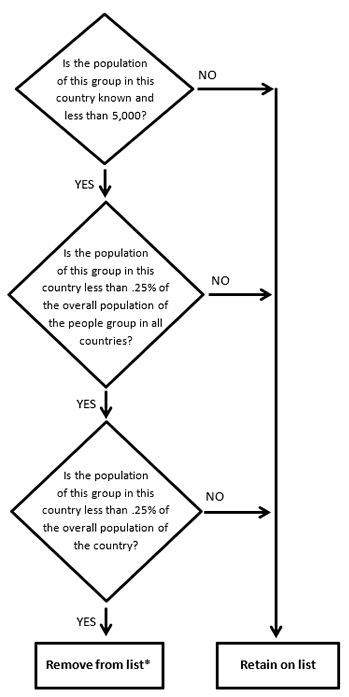Small People Group Policy
A Significant Policy Change - November 2025
Why did the people group count drop from 17,700 to 16,300? Did 1,400 people groups just disappear?
No, they didn't disappear. Joshua Project refined how we count to make the data more practical for actual ministry work.
Here's what happened: we're now focusing the main list on groups you can realistically identify and reach. The groups being moved to the separate small peoples category are tiny diaspora populations that are nearly impossible to locate or engage directly. Think about it: does it make sense to count several hundred Mexicans scattered across Finland as a separate people group that needs its own specific outreach strategy? In almost every case, the best way to reach these very small diaspora communities is through the larger, more accessible populations of the same people group in their home countries or major population centers.
This refinement makes the list more useful for churches, mission teams, and researchers who need to know where to focus their efforts. The underlying data for all groups remains available if you need it.
Our vision hasn't changed at all. Every people group still matters. We're just making it clearer where strategic engagement is actually possible. This helps turn good intentions into effective action.
Given the increased mobility of peoples today, an almost unlimited number of new diaspora people groups could potentially be created.
What This Policy Addresses
This policy addresses how very small groups are handled on the Joshua Project people group list. It provides standards for including or not including very small groups on the active Joshua Project list. Given the increased mobility of peoples, an almost unlimited number of new diaspora people groups could potentially be created. For example, do several hundred Mexicans scattered across Finland constitute a distinct people group that should be added to a global people group list?
Global people group lists are limited in the level of detail they can realistically present. Low levels of detail, such as very tiny diaspora groups, may be beyond the scope of a global list, but very appropriate on country and local lists.
Important exceptions
Very small isolated non-diaspora groups like the Sentinelese of India, Amazon basin peoples, or Australian Aboriginal groups stay on the main list regardless of population because they represent the entire people group, not a scattered subset.
Transient or temporary populations are not tracked by Joshua Project. An example is Vietnamese migrant workers in Malaysia. The transient and temporary nature of these groups makes them virtually impossible to track and unrealistic as a focus for long-term church planting.
Conditions
The following conditions determine when to exclude very small groups of individuals that are part of larger People Groups Across Countries (PGAC).
- Condition 1: The population of this group in this country is less than 5,000
- Condition 2: The population of this group in this country is less than .25% of the total population of the people group in all countries (PGAC). In other words, 99.75% of the people group lives in another country or countries
- Condition 3: The population of this group in the country in question is less than .25% of the overall population of that country.
NOTE: All three conditions must be met in order for a group to be excluded from the main Joshua Project people group list. Put another way, if any of the three conditions above is not met, then the people group is included on the people group list.
All three conditions must be met in order for a group to be excluded from the main Joshua Project people group list.
Rationale
- Condition 1: A baseline cutoff number needs to be established; otherwise the number of people groups by country (PGICs) becomes almost unlimited. For example, there are probably individuals from almost every larger PGAC in the world living in the United States. Therefore, if no cutoff is established, the US alone would potentially have many thousands of distinct people groups (PGICs) listed. A minimum population of 5,000 is proposed as an actionable value.
- Condition 2: This is to ensure that only very tiny portions of the larger people group (PGAC) are considered for exclusion as well as protect small PGAC groups from having meaningful portions excluded. For example, consider a small PGAC group with a global population of 10,000. If 1,000 individuals living in a particular country were excluded based on Condition 1, then 10.0% of the PGAC would be excluded which is too much.
- Condition 3: This is to ensure tiny countries have meaningful groups identified. For example, in a country with total population of 20,000 individuals, 2,500 individuals form a meaningful portion of the country population and should be considered as a people group (PGIC).
Decision Tree

Small Group Data Still Available
Joshua Project retains and makes available all people group data regardless of population size. While not included in the overall people group counts, tiny diaspora groups that have been removed from the main Joshua Project list are available by clicking the "Other reported groups" link at the bottom of each country listing or the "Other reported countries" link at the bottom of each peoples listing.




